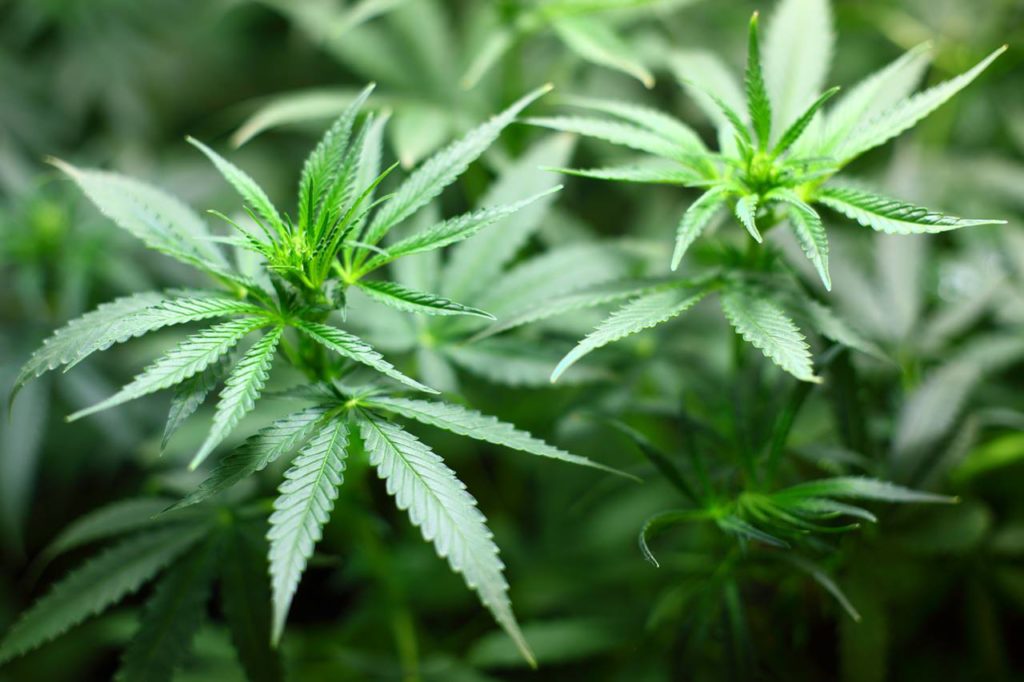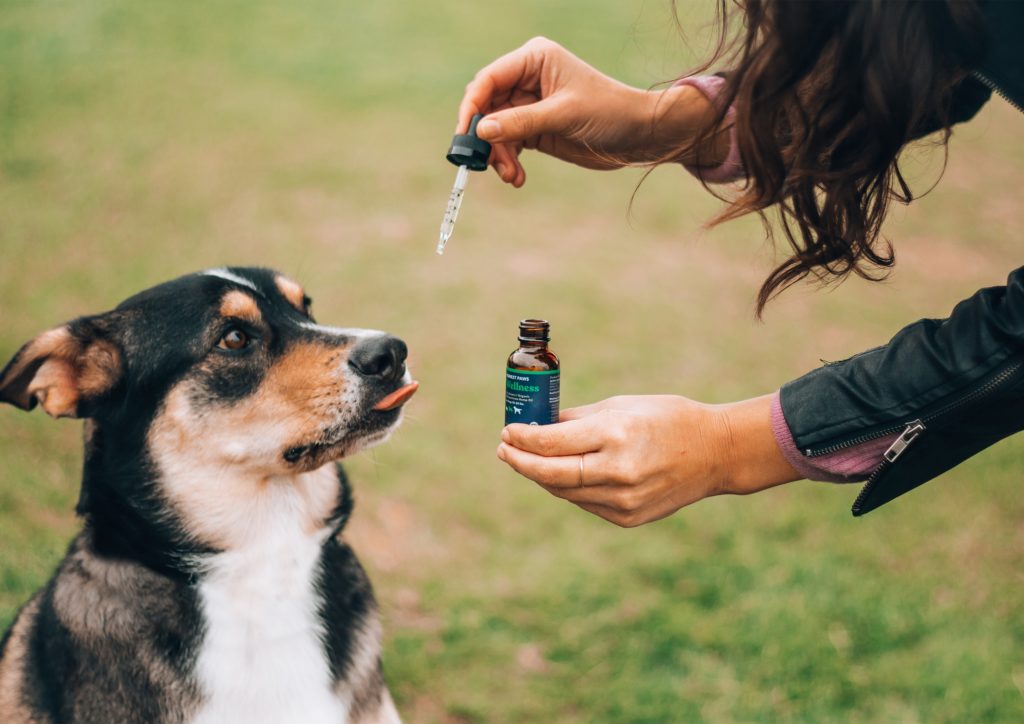As the legalization of medical and recreational marijuana use for humans is becoming more prevalent across the country and globally, CBD oil for dogs has become a heavily debated issue. Holistic vets and some pet owners have been advocating for the use of CBD oil to treat a variety of ailments in dogs. But does it really work?
Though there have not been many studies surrounding the use of CBD oil in dogs, many pet owners have seen success with supplementation. Read more to find out if CBD oil could be right for your dog.
A Note From the Editor
This article is meant to provide you, the reader, with a more informed decision when purchasing CBD oil. This article is not meant to diagnose, treat, or serve as medical advice. Should your pet have a medical issue, please seek advice from a Veterinarian immediately. This content uses referral links. Please read my disclosure policy for more info.
What is CBD?
There are more than 85 different cannabinoids found in the cannabis plant. The two most well known are Tetrahydrocannabinol (THC) and Cannabidiol (CBD). CBD is found in both industrial hemp and marijuana. Unlike THC, CBD is not psychoactive. It’s now legal in most states, unlike marijuana.
CBD is the most abundant cannabinoid, constituting up to 40% of cannabis resin, while hemp oil contains only trace amounts of THC (less than .3%).
How Does CBD Work?
When consumed, CBD interacts with the body through the endocannabinoid system. Humans and other mammals, like dogs, have specific cannabinoid receptor sites. These receptor sites lie in the brain, central nervous system, peripheral organs, and immune cells. Cannabinoids work by initiating compounds naturally produced in our bodies, called endocannabinoids, which when activated help maintain internal health and stability. Simply put, they facilitate communication between cells when there is a deficiency or a problem. Different cannabinoids work most effectively on different receptor sites, thereby causing different effects and types of relief.
Studies in humans have shown that many cannabinoids have anti-inflammatory effects, which can help with pain, tumors, seizures, muscle spasms, skin conditions, appetite stimulation, IBS, and anxiety. Because dogs have similar endocannabinoid systems as humans, it is believed that “CBD has much the same effect in animals as it does in people,” says Dr. Gary Richter, a California-based holistic veterinarian and author of “The Ultimate Pet Health Guide.” One study in particular found that the CBD “binds to these [endocannabinoid] receptors for a longer duration [in dogs], and evokes long-lasting therapeutic response without causing toxic effects.” [1]
Taking a CBD supplement can help your dog’s body to maintain homeostasis, and manage physical and emotional stress.
What are the Benefits of CBD Oil For Dogs?
Although scientific research on CBD for pets is limited, the evidence suggests that treating animals with CBD oil can be both a safe and beneficial option for a wide range of ailments.
We cannot stress this enough, but always consult your veterinarian before supplementing with CBD oil. Just note that in the United States, it is still illegal for vets to prescribe cannabis or its derivatives to patients. In some cases they may not even be familiar with CBD or its success stories or may even be negatively bias towards the idea.
Pain and Arthritis Relief
- CBD oil has shown success in treating both chronic pain and arthritis as well as acute ailments like sprains and strains.
Treatment for Seizures and Epilepsy
- One study conducted in Colorado showed such promising results that there are now more clinical studies underway to determine the efficacy of CBD for treatment of epilepsy in dogs.[2]
Boosts Appetite
- CBD has been shown to help with anorexia in dogs, most likely by relieving symptoms of stomach pain, inflammation of the digestive system, pain in the mouth or throat, or advanced periodontal disease. CBD also boosts appetite by suppressing nausea.
Reduce Anxiety
- Anxiety can be difficult to diagnose especially when you do not know the trigger. Common signs your dog is suffering from anxiety are: panting, pacing, whining, shaking, barking, or aggression. CBD is can alleviate anxiety by helping to control generalized stress as well curb obsessive behaviors.[3]
Fight Cancer and Tumors
- Cancer cells, unlike normal healthy cells, do not die on their own when old or damaged. This is why they grow and divide to form tumors. CBD has been shown in scientific studies to cause apoptosis, or cell death, and stop the growth of tumors.[4]
What is the difference between Hemp and Marijuana?
While both are considered cannabis, they are very different in both cultivation process and application. Marijuana is used for medicinal or recreational purposes, whereas hemp is processed to be used in dietary supplements, skin products, fabrics, and even food.
Hemp has less than .3% THC, meaning it is not psychoactive, or it won’t get your dog high like marijuana. Marijuana should NEVER be given to dogs as it can pose a serious health risk.

What’s the difference between Hemp Oil and CBD Oil?
Hemp oil is pressed from the seeds of the hemp plant, and does not contain the same amount of cannabinoids found in cannabis oils extracted from the whole plant. Hemp oil does have trace amounts of CBD, but medicinal CBD oil extracts should contain between 3% and 30% CBD.
To add to the confusion, some manufacturers label their CBD products as hemp oil, and many use hemp oil as a carrier base. There is some debate about the effectiveness of CBD derived from industrial hemp versus CBD derived from marijuana plants, however it should be noted that neither of these products should contain more than .3% THC when used purely as a CBD supplement.
The most important factor is:
How much CBD does the product contain? This information is a must have before buying so you can dose properly. If it’s not listed, don’t buy it! It could be plain hemp oil and contain almost no CBD!

Common Questions About CBD Oil
Is CBD Oil Bad For My Dog?
No, CBD is not bad for dogs, when used properly. Most pet parents will find that supplementing CBD is beneficial and leads to a better quality of life for their dog.
What are the Side Effects of CBD Oil?
The most common side effect of CBD oil is drowsiness. On occasion, some dogs may experience gastrointestinal issues, but it is not common. To curtail any negative side effects, start at a very minimal amount to allow your dog to get used to CBD. Every brand should come with dosing guidelines but it’s important to work your way up to the intended dose as your dog may require less.
While an overdose of CBD is not likely, there is still some risk. The most significant is THC toxicity, meaning your dog is “high”. Should this occur, your dog may not be able to stand, walk, or eat. This would most likely happen if marijuana is ingested, not CBD oil, but if you suspect an overdose, take your dog to the vet immediately.
It’s important to know your source to ensure you are getting a product that is pure and won’t cause any kind of reaction. All medicinal CBD products must provide information on both the amounts of CBD and THC on the label (THC should be less than 1%, usually its .3%), as well as the dosage information. If the manufacturer uses inorganic pesticides or chemical fertilizers, there’s a risk of a reaction if your dog is allergic to these chemicals. Not to mention any other long term side effects.
Is CBD Oil Legal?
As of 2018, Alaska, California, Colorado, Maine, Massachusetts, Nevada, Oregon, and Washington have all legalized use of cannabis (including both marijuana and hemp) for recreational and medicinal use. While this is a human law, it still limits how we are able to obtain CBD for our pets.
CBD oil is legal all 50 states, but there are some caveats. Hemp derived CBD oil is legal in every state, but marijuana derived CBD is not. Some states do allow use of marijuana derived CBD products with a prescription or with specified amounts of THC levels allowed. Most products sold online are made with hemp to comply with these laws. It is still illegal for veterinarians to prescribe CBD because cannabis is recognized as a Schedule 1 substance by the Federal Government. Many expect these laws will change in the future, but even so, it’s best to check with your care provider before supplementing with CBD.
Where Can I Buy CBD Oil For My Dog?
In the 8 states where marijuana products are legal, you can purchase CBD products at pet specialty stores and cannabis dispensaries. Everywhere else, the best place to buy is online. There are many sources for quality CBD products including:
How do I Choose a Brand of CBD Oil?
The first thing to look out for when selecting a CBD product is that it actually contains CBD. Products labeled “hemp-infused” or “hemp-based” may not contain any CBD at all! The levels of cannabidiol and THC should be specified on the bottle or manufacturer’s website. Better yet they provide 3rd party testing results.
Organic vs Not Organic
When evenly matched on all other factors, I’d always lean towards organic rather than not. It’s hard work to become certified organic and it’s a regulated term. You don’t want traces of chemical fertilizers or pesticides in your dog’s supplements. However, if a company uses organic practices, like Charlotte’s Webb, but doesn’t carry the label they should not be disqualified.
What is the Best Form of CBD For Dogs?
Canine research has shown that dogs metabolize cannabinoids quite well, and that CBD oil tinctures provide the best results. Supplements made with the whole hemp extract also provide the beneficial terpenes, cannabinoids, vitamins, minerals, fatty acids, phytonutrients.
Always start supplementing with a CBD oil tincture that is specifically formulated for dogs. This is easily done by dropping the oil directly into your dog’s mouth or by sprinkling it on their food.
Topical products can be another way to get CBD into your dog’s routine but this is harder to measure.
CBD treats can be a more palatable way to supplement CBD, but it’s easy to go overboard and they should be used sparingly
How Do I Know The Correct Dose Of CBD Oil For My Dog?
Always refer to the manufacturer’s instructions for dosing and start with the lowest dose possible. Improper dosing will commonly result in lethargy and drowsiness, but in more severe cases can cause nausea and/or vomiting. The general rule is to start with one drop per 10 lbs of your dog’s body weight (this would be 4 drops of oil if your dog weighs 40 lbs), but this of course depends on potency. Administer the oil directly under your dog’s tongue once per day. You should monitor your dog’s health and behavior closely for a week. If there is no clear improvement, up the dose to twice per day. The goal should always be to start low and work your way to a dose where you see improvement.
How Do I Add CBD Oil to My Dog’s Diet?
Use a CBD oil tincture specially formulated for dogs, and drop directly into your dog’s mouth, under the tongue, or onto her food.
Will My Dog Get High From CBD Oil?
No your dog will not get “high” from CBD oil. CBD oil supplements should contain less than 1% and most often less than .3% THC and produce no psychoactive effects.
Can My Dog Overdose On CBD Oil?
While an overdose of CBD is not likely, there is still some risk. The most significant is THC toxicity, meaning your dog is “high”. Should this occur, your dog may not be able to stand, walk, or eat. This would most likely happen if marijuana is ingested, not CBD oil, but if you suspect an overdose, take your dog to the vet immediately.
Sources
[1] Harvey DJ , et al. (n.d.). Comparative metabolism of cannabidiol in dog, rat and man. – PubMed – NCBI. Retrieved from https://www.ncbi.nlm.nih.gov/pubmed/1806942
[2] Efficacy of Cannabidiol for the Treatment of Epilepsy in Dogs. (n.d.). Retrieved from http://csu-cvmbs.colostate.edu/vth/veterinarians/clinical-trials/Pages/efficacy-of-cannabidiol-for-the-treatment-of-epilepsy-in-dogs.aspx
[3] Cannabidiol as a Potential Treatment for Anxiety Disorders. (n.d.). Retrieved from https://link.springer.com/article/10.1007%2Fs13311-015-0387-1
[4] Cannabinoid-induced apoptosis in immune cells as a pathway to immunosuppression. (n.d.). Retrieved from https://www.ncbi.nlm.nih.gov/pmc/articles/PMC3005548/
